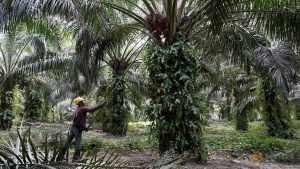
A worker collects palm oil fruits at a plantation in Bahau, Negeri Sembilan, Malaysia, Jan 30, 2019.
KUALA LUMPUR: Malaysia is losing up to 25 per cent of its potential palm oil yield due to a labour shortage that is expected to worsen in the coming months, the Malaysian Palm Oil Association (MPOA) said on Monday (Jul 20).
The group, which represents plantation firms, said the government’s decision to freeze the recruitment of new foreign workers until December could lead to the “demise” of the industry.
“Pre-COVID, we were already short of 36,000 workers. This (shortage) has already resulted in us not realising our potential production by 10 per cent to 25 per cent,” MPOA Chief Executive Officer Nageeb Wahab said in a conference.
Malaysia, the world’s second-biggest palm oil producer, relies on workers from countries such as Indonesia and Bangladesh as they account for 84 per cent of its plantation workforce.
Thousands have already left palm estates for home as borders closed, and the group said it had not been able to replace those who had left.
A dearth of workers could delay palm fruit harvesting and curb oil output, especially ahead of the peak production season that starts around September.
Nageeb said plantation companies were actively hiring locals in support of the government’s policy, but locals were not interested in what they see as dirty, dangerous, difficult and demeaning work.
“If this (local recruitment effort) fails, we will need the government to help us,” he added.
Deputy Plantation Industries and Commodities Minister Willie Mongin said the ministry was in talks with industry groups to address the labour concerns.
“We will discuss and formulate a strategy to address (the) labour shortage issue,” he said during the conference.
Willie also said Malaysia was planning to file a World Trade Organisation case against the European Union over its restrictions on palm oil biofuel by this year.
“We are adamant and steadfast in taking legal action against the EU on its discrimination towards Malaysian palm oil,” he said.

